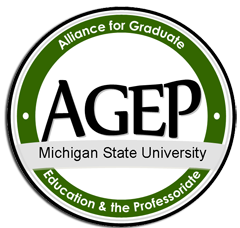This semester was an opportunity for reinvention where we had to reconsider how teaching, learning, and community-building occurs and how to retain authenticity and effectiveness when transitioning from the traditional lecture hall to new digital modes of delivery. At the Graduate School, we were able to adjust fairly deftly, sustaining our flagship program offerings aimed at graduate student success. Here are a few highlights from the semester:

In October, AGEP – MSU’s premier graduate learning community for diversity, equity and inclusion – convened 226 people and 103 institutions virtually at its 2020 Student Success Conference: Creating a Vision for a Greater Tomorrow through Research. The digital event, conducted across Zoom and EasyVirtualFair platforms, proved to be a dynamic cross-disciplinary experience bringing together scientists, engineers, policy makers, community leaders and students. Key program offerings included recruitment, poster presentation sessions, guidance in professional development from accomplished scholars and professionals on topical issues such as Culturally-Responsive Mentoring, and much more. The conference was sponsored by the Graduate School at MSU, John Hopkins Applied Physics Laboratory, Vanderbilt School of Engineering, Rush University Graduate School, the Joint School of Nanoscience and Nanoengineering (JSSN), the Facility for Rare Isotope Beams, and MSUFCU.

Earlier, in August, all the Graduate School’s new student orientations were converted successfully to online formats, providing an experimental opportunity to test the design and relative efficacy of virtual programs. A highlight was the Graduate Teaching Assistant (GTA) Orientation, which doubled participation levels of previous years, attracting 589 participants from across MSU colleges; several of whom were international TA’s who tuned in from abroad, representing 12 different countries. Graduate Teaching Assistants are a vital part of the MSU community, collectively teaching 260 courses and 10,400 undergraduate students annually.
Community-building, professional development, and wellness programs continued to be offered by the Graduate School throughout the course of the semester via Zoom. Below, Hima Rawal, Fullbright scholar and PhD Candidate in the Second Language Studies Program in the College of Arts and Letters, who worked with Stephanie Baier, Curriculum Development Director at the Graduate School, to run the popular program, ‘Lunch & Learn,’ reflects on the experience:
Long before I was appointed as a Graduate Teaching Assistant in my PhD program in the Fall of 2018, I had been frequently visiting the graduate student lounge in Chittenden Hall to engage in teaching related discussions with some of my fellow graduate students from different departments. Although I had taught for about a decade (collectively in K-10 and university levels) in Nepal before I came to MSU as a graduate student, our discussions in Chittenden Hall worked as a catalyst for me to reflect on my then existing beliefs about teaching and teacher professional development. The Graduate School’s trainings for GTAs, and especially the workshops for international GTAs were very helpful to understand the striking differences between classroom cultures at MSU and in my previous institutions in Nepal. In addition, the orientations from my own program (Second Language Studies) about different aspects related to teaching college students garnered my confidence in teaching. I received very motivating and affirmative student reviews. However, I was still looking for avenues to constantly engage in conversations about how to improve my teaching, how to address the needs of my students in as culturally relevant ways as possible, and how to build and cultivate pedagogies of care for my students who are prospective teachers. This is when I came to know about the “Lunch & Learn: Best practices for Teaching” workshops which have been providing me with wonderful opportunities to share with and learn from my fellow graduate teaching assistants from different departments and diverse linguistic and cultural backgrounds.
With all the workshops I have attended, co-hosted, and presented so far, I have been constantly self-reflecting on my own teaching beliefs and practices. One of the many highlights of the workshops was a very inspiring presentation on the key elements of high impact practices by Stefanie Baier in the Spring of 2020. This workshop prompted me to analyze my teaching from both macro and micro perspectives. In the workshops, I have learned about multiple culturally relevant practices of teaching, active learning, student engagement as a multi-dimensional construct, to name a few. After all, teaching is not only about re-constructing my teacher identity and knowledge but also about maximizing student learning in as humanizing ways as possible. I am learning to make a balance between both. In addition, these constant interactions and my willingness to further engage in pedagogical and professional communities motivated me to apply for cohort fellowships. I am fortunate to be an RCAH (Residential College of Arts and Humanities) fellow for 2020-2021 where I have had ample opportunities to discuss several pedagogy related topics with my RCAH fellows.
Based on my experiences of such teacher training programs, I can affirm that there are mainly three benefits (among several others). First, GTAs get an array of opportunities to widen their horizons about their pedagogical knowledge. We may not necessarily become good teachers by virtue of our expertise in our respective fields. We need training, experience, and constant self-reflection to be qualified teachers. Second, these teacher training programs are spaces for the co-construction of pedagogical knowledge where everyone brings funds of knowledge with them and share with each other. Personally, these interactions give me more agency to build on and cultivate ways of learning and teaching. Third, and perhaps most important for the current trying times, these workshops and trainings give us an empathetic view to understand similarities in differences. Over the last nine months, I have heard from fellow GTAs about the challenges in teaching in the online platforms, concerns and questions about engaging our students in synchronous and asynchronous classes. More importantly, our discussions have been on how to humanize teaching as best as possible. It feels like we are not alone and are in the same boat, navigating teaching in these unprecedented times with the support, resources, and communities of practice provided by the Graduate School.


